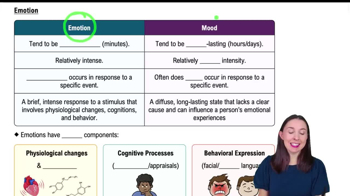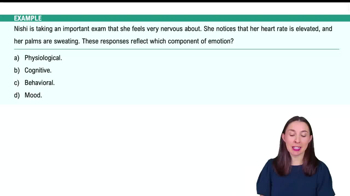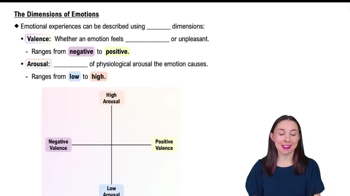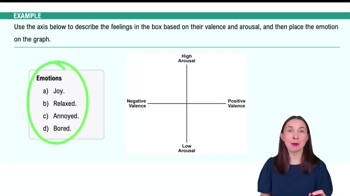Table of contents
- 1. Introduction to Psychology1h 43m
- 2. Psychology Research2h 20m
- 3. Biological Psychology2h 41m
- 4. Sensation and Perception28m
- 5. Consciousness and Sleep32m
- 6. Learning41m
- 7. Memory34m
- 8. Cognition37m
- 9. Emotion and Motivation35m
- 10. Developmental Psychology33m
- 11. Personality48m
- 12. Social Psychology41m
- 13. Stress and Health41m
- 14. Psychological Disorders44m
- 15. Treatment47m
9. Emotion and Motivation
Emotion
Struggling with Psychology?
Join thousands of students who trust us to help them ace their exams!Watch the first videoMultiple Choice
Which statement below correctly identify the difference between a mood and an emotion?
I) Emotions are often in response to a specific event, while moods are usually not.
II) Moods are relatively intense, while emotions are not.
III) Emotions are usually fleeting, while moods are relatively long-lasting.
A
I & II.
B
I & III.
C
II & III.
D
I, II, & III.
 Verified step by step guidance
Verified step by step guidance1
Understand the definitions: Emotions are typically short-lived feelings that are in response to a specific event or situation. Moods, on the other hand, are more generalized feelings that are not necessarily tied to a specific event and can last for a longer period.
Analyze statement I: 'Emotions are often in response to a specific event, while moods are usually not.' This aligns with the definition of emotions being event-specific and moods being more general.
Analyze statement II: 'Moods are relatively intense, while emotions are not.' This statement is incorrect because emotions are generally more intense and immediate reactions, whereas moods are less intense but more prolonged.
Analyze statement III: 'Emotions are usually fleeting, while moods are relatively long-lasting.' This is consistent with the understanding that emotions are short-lived and moods can persist over time.
Combine the correct statements: Based on the analysis, statements I and III correctly describe the differences between moods and emotions.
Related Videos
Related Practice
















